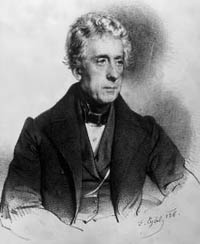Johann Philipp Neumann: Difference between revisions
Citation bot (talk | contribs) Add: publisher. | Use this bot. Report bugs. | Suggested by BorgQueen | Category:1849 deaths | #UCB_Category 287/921 |
ibox |
||
| Line 1: | Line 1: | ||
{{Short description|Austrian physicist, librarian and poet (1774–1849)}} |
{{Short description|Austrian physicist, librarian and poet (1774–1849)}} |
||
{{Infobox person/Wikidata |
|||
[[File:Johann Philipp Neumann.jpg|thumb|right|A [[lithograph]] of Neumann by [[Franz Eybl]].]] |
|||
| fetchwikidata=ALL |
|||
}} |
|||
'''Johann Philipp Neumann''' (27 December 1774 – 3 October 1849) was an [[Austria]]n physicist, librarian and poet. |
'''Johann Philipp Neumann''' (27 December 1774 – 3 October 1849) was an [[Austria]]n physicist, librarian and poet. |
||
Revision as of 09:51, 27 July 2024
Johann Philipp Neumann | |
|---|---|
 Johann Philipp Neumann (1774-1849), Austrian physicist, librarian and poet | |
| Born | 29 December 1774 Třebíč |
| Died | 3 October 1849 Vienna |
| Occupation | Physicist, poet, librarian |
Johann Philipp Neumann (27 December 1774 – 3 October 1849) was an Austrian physicist, librarian and poet.
Born in Trebitsch in Moravia, he completed his studies at the University of Vienna. In 1803, he was appointed as a professor of physics at his local lyceum. He was transferred to the University of Graz in 1806, where he became a rector in 1811.
In 1815, he was appointed as a professor at the Polytechnic Institute in Vienna (now the Vienna University of Technology). He founded a library here in 1816, which he directed until 1845.
Neumann was a friend of the composer Franz Schubert.[1] Neumann adapted Georg Forster's translation of Shakuntala as a libretto for an opera, which Schubert commenced in 1820 but never competed.[2] Neumann, a liberal-minded churchman, was interested in simple music designed to appeal to "the widest possible congregation".[2] To this end, he wrote the text of 8 hymns and a translation of the Lord's Prayer, and commissioned the Deutsche Messe from his friend in 1826.
He retired in 1844, and died in Vienna in 1849.
References
- ^ Glover, Raymond F., ed. (1990). The Hymnal 1981 Companion. Church Publishing. p. 71. ISBN 9780898691436.
- ^ a b Newbould, Brian (1999). Schubert: The Music and the Man. University of California Press. p. 140. ISBN 9780520219571.
